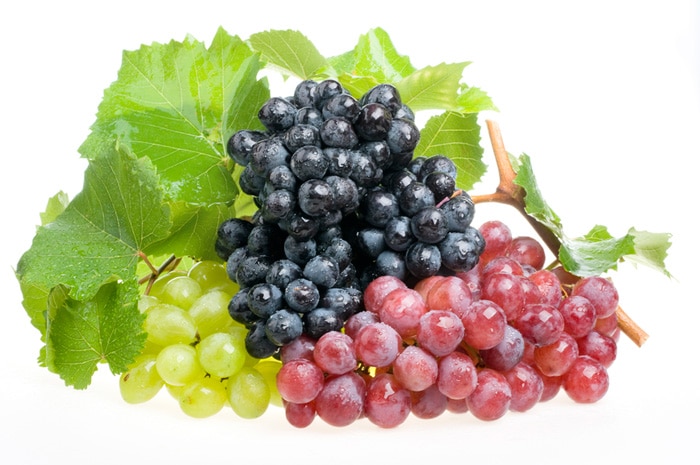
Written By: Gloria Tsang, RD
Title: Founding Registered Dietitian
Alumni: University of British Columbia
Last Updated on:

Grapes have been around a really long time. In fact, the first grape varieties might date as far back as 6000 B.C.
Grapes from California, however, were not cultivated until1839 when a trapper from Kentucky planted the state’s first table grape vineyard in the Mexican colonial pueblo now known as Los Angeles. California grapes, available May through January, are now shipped to more than 60 countries around the world.
Table of Contents
3/4 cup of grapes contains:

Research has shown that grapes of all colors – red, green and black – are a natural source of beneficial components called polyphenols, which are antioxidants. Grape polyphenols appear not only to protect the health and function of our cells; they may contribute to a healthy heart, and help defend against a variety of age-related and other illnesses.
Grapes provide potassium as well, and are a good source of Vitamin K. Potassium is essential for the heart, kidney and other organs to work normally, while Vitamin K plays a key role in helping blood to clot in order to prevent excessive bleeding and may also be important in bone health.
Look for grapes with green, pliable stems and plump berries. The powdery-white coating on the grapes is the “bloom” and it’s good! Bloom is a naturally occurring substance that protects grapes from moisture loss and decay.
Grapes keep for up to two weeks when handled properly. Store grapes unwashed in the refrigerator; rinse just before serving or adding to a recipe. Like most berries, grapes tend to absorb odors. Try to avoid storing them next to things like onions or leeks.
Grapes can be eaten fresh, frozen and as a wonderful addition of flavor and texture to anything from salads to sides, drinks to desserts.
Alumni: University of British Columbia – Gloria Tsang is the author of 6 books and the founder of HealthCastle.com, the largest online nutrition network run by registered dietitians. Her work has appeared in major national publications, and she is a regularly featured nutrition expert for media outlets across the country. The Huffington Post named her one of its Top 20 Nutrition Experts on Twitter. Gloria’s articles have appeared on various media such as Reuters, NBC & ABC affiliates, The Chicago Sun-Times, Reader’s Digest Canada, iVillage and USA Today.
antioxidant, fruits, grapes, grocery aisle, healthy every month, polyphenols